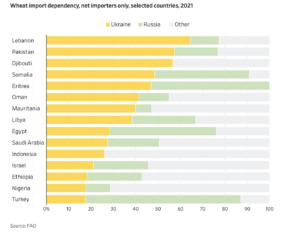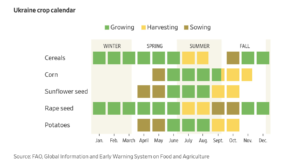China, the world’s largest soybean importer, has ramped up orders for Brazilian cargoes of the oilseed after meeting an initial shipment volume from the US as part of a trade…
75 Million Tonnes of Grain Could be Stuck in Ukraine by Fall, Kyiv Notes Anti-ship Weapons Could Help Secure Exports
Reuters writers Simon Lewis and Daphne Psaledakis reported yesterday that, “U.S. Secretary of State Antony Blinken said on Monday there are ‘credible reports‘ that Russia is ‘pilfering’ Ukraine’s grain exports to sell for profit.
“Speaking during a virtual roundtable with philanthropies, non-governmental organizations and private sector entities, Blinken said the alleged theft was part of broader Russian actions during its war in Ukraine that have hit Ukraine’s ability to export its wheat crop and worsened a global food security crisis.
“‘There are credible reports, as we saw in one of our leading newspapers today, that Russia is pilfering Ukraine’s grain exports… to sell for its own profit,’ Blinken said, an apparent reference to a New York Times story that said Washington last month warned 14 countries, mostly in Africa, that Russia was trying to ship stolen Ukrainian grain to buyers overseas.”

And Reuters writer Michelle Nichols reported yesterday that, “Russia’s U.N. Ambassador Vassily Nebenzia stormed out of a U.N. Security Council meeting on Monday as European Council President Charles Michel addressed the 15-member body and accused Moscow of fueling a global food crisis with its invasion of Ukraine.”
The article noted that, “U.N. Secretary-General Antonio Guterres is trying to broker what he calls a ‘package deal‘ to resume Ukrainian food exports and Russian food and fertilizer exports. Russian Foreign Minister Sergei Lavrov is due to visit Turkey on Wednesday to discuss unlocking grain exports from Ukraine.”
In more detailed reporting on Russia, Turkey and exports, Bloomberg writers Firat Kozok and Selcan Hacaoglu indicated yesterday that, “Turkey and Russia have reached a tentative deal to restart shipments of Ukraine’s agricultural products from a key Black Sea port, but Kyiv remains skeptical of the proposed pact, according to people familiar with the discussions.
“Turkish President Recep Tayyip Erdogan’s government has offered military help to clear mines off the coast of Odesa and escort grain ships but Ukraine has yet to endorse the plan, worried that removing defenses could leave the vital port open to Russian attack, the people said, speaking on condition of anonymity to discuss matters that aren’t yet public. Turkey hopes that a United Nations endorsement of the proposal could allay security concerns, the people said.
“Ukrainian President Volodymyr Zelenskiy said Kyiv wasn’t invited to talks on the deal set for Ankara this week. Russian Foreign Minister Sergei Lavrov, who is scheduled to visit the Turkish capital Wednesday for discussions, said Monday he’s optimistic that military officials can work out a solution.”

Meanwhile, Reuters writer Natalia Zinets reported yesterday that, “Ukrainian President Volodymyr Zelenskiy said on Monday there could be as much as 75 million tonnes of grain stuck in Ukraine by this autumn and that Kyiv wanted anti-ship weapons that could secure the safe passage of its exports.
Ukraine, Zelenskiy told a briefing in Kyiv, has been discussing with Britain and Turkey the idea of a third country’s navy guaranteeing the passage of Ukrainian grain exports through the Russia-dominated Black Sea.
“The strongest guarantee of their safe passage though would be Ukrainian weaponry, he told reporters.”
And a separate Reuters article yesterday by Natalia Zinets indicated that, “Ukraine is not ready to agree to a plan to export its grain by rail across Belarus for shipment via the Baltic Sea to bypass Russia’s blockade of its Black Sea ports, President Volodymyr Zelenskiy said on Monday.”
In other developments, Financial Times writer Heba Saleh reported yesterday that, “Farmers and officials said soaring grain prices in the wake of Russia’s invasion of Ukraine have underscored the importance of the local wheat market in Egypt, the world’s biggest grain importer.
“As global supplies tighten, the Egyptian government is determined to get its hands on as much of this year’s crop as it can, and it has been leaning on farmers to sell back 60 per cent of their harvest. Longer-term, the state is working to boost output through promoting techniques such as those used in Nubaria, hoping that by 2025 the local crop could meet as much as 65 per cent of its needs, up from 45 per cent.”
Elsewhere, Reuters writer Ana Mano reported yesterday that, “Brazil is testing a variety of drought resistant, genetically modified wheat in a bid to become more self-sufficient in the staple crop as global supplies tighten.”
Also yesterday, Bloomberg News reported that, “China’s farmers are making progress on government orders to bolster food security by ensuring this season’s wheat harvest goes smoothly.
“The country gathered 55% of its winter wheat crop as of June 6, passing the 50% mark two days earlier than last year, the Ministry of Agriculture and Rural Affairs said in a statement late Monday.”
With respect to U.S. production, Reuters writer Naveen Thukral reported today that, “The U.S. Department of Agriculture (USDA) on Monday rated 73% of the U.S. corn crop as good to excellent in its first condition ratings for the 2022 crop, above the average estimate of 68% in a Reuters analyst poll.
“In a weekly crop progress report, the USDA said U.S. farmers had planted 94% of their intended corn acres by Sunday, up from 86% a week earlier and ahead of the five-year average of 92%, despite a slow start following a cold, wet spring in much of the Midwest.
“For soybeans, the agency said U.S. farmers had planted 78% of their intended acreage, below the average estimate in the Reuters poll of 80%. The USDA’s figure was up from 66% a week ago, but just behind the five-year average of 79%. The government expects to release soybean condition ratings starting with next week’s report.”





